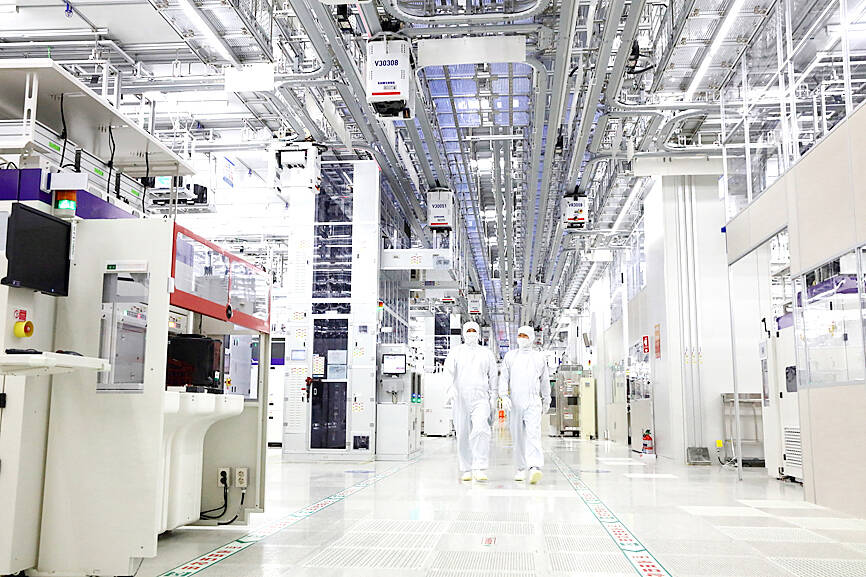A chip plant that South Korea’s Samsung Electronics Co is building in Taylor, Texas, would cost the world’s biggest memorychip maker more than US$25 billion, up more than US$8 billion from initial forecasts, three people familiar with the matter said.
The increase in cost is primarily due to inflation, the people said, declining to be named because the information is not public.
“The higher construction cost is about 80 percent of the cost increase,” one of the sources said. “The materials have gotten more expensive.”

Photo: Reuters
“The newly estimated cost could go up even more if the construction of the Taylor plant gets delayed,” a second source said, adding that the estimate could be fluid.
“The later the plant is completed, the higher cost we would be looking at,” they said.
Samsung did not immediately respond to a request for comment.
Chipmakers are applying for billions of US dollars in grants from US President Joe Biden’s administration through the Creating Helpful Incentives to Produce Semiconductors (CHIPS) and Science Act, aimed at ramping up chip production in the US.
However, increasing costs raise questions about how far those dollars will go. The bill was proposed in 2020, before a historic run-up in inflation that US officials are still working to tame.
Most US government grants would only cover up to 15 percent of the cost of new plants, US Department of Commerce officials said early this month.
In the three years since lawmakers first floated the US$52 billion figure for CHIPS Act grants, of which only US$39 billion is earmarked for direct investment in plant construction, the cost of labor has risen sharply, along with the price of construction materials such as steel.
That could push up the cost of what are already huge spending plans.
Last year, Taiwan Semiconductor Manufacturing Co (台積電), the world’s largest contract chip manufacturer, announced it was more than tripling a planned investment in a new plant in Arizona to US$40 billion.
Intel Corp announced a US$20 billion chip factory in Ohio that could cost up to US$100 billion, while Micron Technology Inc last year said that it planned to invest up to US$100 billion over the next 20-plus years to build a computer chip factory complex in upstate New York.
Samsung, the world’s No. 2 contract chip manufacturer, announced its Taylor plant in 2021.
It aims to make advanced chips for functions such as artificial intelligence, 5G and mobile phones, and promises to create 2,000 high-tech jobs.
Unlike some of its rivals, Samsung has already broken ground.
The company is rushing to finish the plant by next year so it can produce chips by 2025, which would put the company ahead of a 2026 deadline to secure investment tax credits on tools for the factory, one of the sources said.
Samsung has already spent as much as half of the US$17 billion initially projected for the Taylor site, two of the sources said.

Vincent Wei led fellow Singaporean farmers around an empty Malaysian plot, laying out plans for a greenhouse and rows of leafy vegetables. What he pitched was not just space for crops, but a lifeline for growers struggling to make ends meet in a city-state with high prices and little vacant land. The future agriculture hub is part of a joint special economic zone launched last year by the two neighbors, expected to cost US$123 million and produce 10,000 tonnes of fresh produce annually. It is attracting Singaporean farmers with promises of cheaper land, labor and energy just over the border.

US actor Matthew McConaughey has filed recordings of his image and voice with US patent authorities to protect them from unauthorized usage by artificial intelligence (AI) platforms, a representative said earlier this week. Several video clips and audio recordings were registered by the commercial arm of the Just Keep Livin’ Foundation, a non-profit created by the Oscar-winning actor and his wife, Camila, according to the US Patent and Trademark Office database. Many artists are increasingly concerned about the uncontrolled use of their image via generative AI since the rollout of ChatGPT and other AI-powered tools. Several US states have adopted

A proposed billionaires’ tax in California has ignited a political uproar in Silicon Valley, with tech titans threatening to leave the state while California Governor Gavin Newsom of the Democratic Party maneuvers to defeat a levy that he fears would lead to an exodus of wealth. A technology mecca, California has more billionaires than any other US state — a few hundred, by some estimates. About half its personal income tax revenue, a financial backbone in the nearly US$350 billion budget, comes from the top 1 percent of earners. A large healthcare union is attempting to place a proposal before

KEEPING UP: The acquisition of a cleanroom in Taiwan would enable Micron to increase production in a market where demand continues to outpace supply, a Micron official said Micron Technology Inc has signed a letter of intent to buy a fabrication site in Taiwan from Powerchip Semiconductor Manufacturing Corp (力積電) for US$1.8 billion to expand its production of memory chips. Micron would take control of the P5 site in Miaoli County’s Tongluo Township (銅鑼) and plans to ramp up DRAM production in phases after the transaction closes in the second quarter, the company said in a statement on Saturday. The acquisition includes an existing 12 inch fab cleanroom of 27,871m2 and would further position Micron to address growing global demand for memory solutions, the company said. Micron expects the transaction to